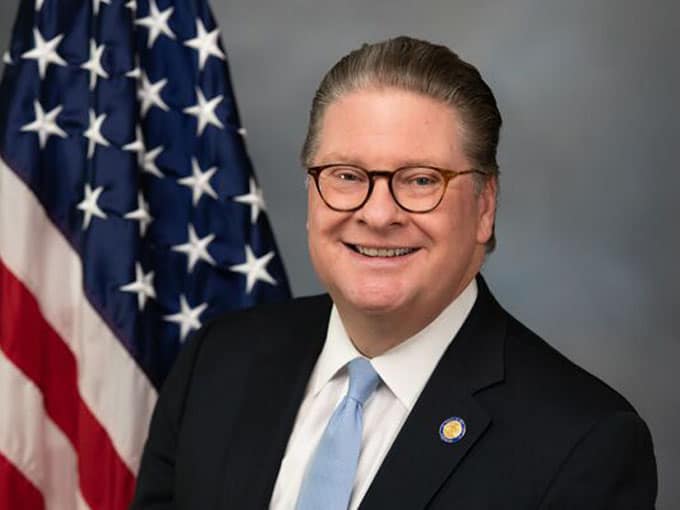
Gina Arena

State Senator Pete Harckham
Home Rule Protects Us from Albany
By Gina Arena
Suburban communities have been under assault by New York State and the federal government for several years now, and some of our Democrat legislators have outright embraced the effort.
From 2008 – 2017, The U.S. Department of Housing and Urban Development (HUD) worked to dissolve local zoning in seven Westchester communities, which they outrageously labeled “racist” for having single-family zoning, much of it ¼ acre. The feds, and the local elected leaders who bowed down to them, refused to acknowledge that local zoning determines where projects can be built in towns and villages, not who can live there. (It’s worth noting that Westchester is the most diverse county in New York State outside the five boroughs of New York City, something we can be proud of.)
Then, in 2022, State Senator Peter Harckham, one of HUD’s kowtowers, tried to pull another fast one on his constituents. Harckham sponsored legislation to effectively erase local zoning laws in Westchester and Putnam communities near train stations. Under Harckham’s bill, multi-family buildings could be erected as-of-right in quiet residential neighborhoods in Putnam and Westchester, threatening their resources, character, and traffic patterns. Extraordinary organic blowback convinced Harckham to pull his measure.
Now, Harckham is at it again, this time by working to give New York State authority over local communities in placing massive energy facilities. Harckham seems to believe that progressives in Albany, like him, know what’s better for our communities than we do. We only live here.
I mention Harckham by name because he refused to use mine in an attack on me recently published in these pages. The subject was the proposal to build the largest battery farm in America in the Mahopac-Somers-Carmel area which I and thousands of my neighbors adamantly oppose. That opposition caused Harckham to take a step back, this time saying he’s supporting a “temporary” moratorium on the project. We all know what “temporary” means in New York.
Harckham and his progressive allies in Albany are making a habit of advancing projects against the will of everyday New Yorkers. The disastrous $15 Congestion Pricing Tax proposal, for example, which Harckham supports, just wasted more than half a billion dollars in taxpayer funds for license plate readers that will likely never be used. Governor Hochul, with Harckham’s full support, buried congestion pricing in a budget bill to avoid public debate.
Once again, they knew better, and it cost us. It doesn’t stop there: Also in 2022, Harckham threatened to cut off all state funding for local public schools with mascots he deemed offensive. He walked that one back, too. He also supported the natural gas ban on new residential construction in large swaths of the state. Albany knows better than new homeowners, it seems. Harckham knows better than car owners as well. Under a law he backed, all new vehicles in New York have to be electric by 2035, regardless of whether people want or can afford them.
I won’t even go into his plan to bring socialized medicine to New York, other than to note that Harckham’s legislation would abolish private health insurance in the state and increase personal income tax rates from 6.65 percent to 18.3 percent for those earning $150,000 per year or more. Pete knows best, just as he did in legalizing marijuana without adequate safeguards in place. The result is thousands of illegal pot shops across the region selling completely unregulated products.
I’m running for State Senate to represent the everyday, common-sense residents of Westchester, Putnam, and Rockland who actually know a thing or two about their hometowns,” writes Arena.
State Senator Pete Harckham, wrote the following OP-Ed on June 12,
It’s time to set the record straight on the 116-megawatt battery energy storage system proposed for a 93.5-acre parcel of land in Mahopac on the Carmel-Somers town line. The Union Energy Center project, which will be discussed at a June 19 public hearing of the Carmel Town Board, has caused residents considerable consternation.
Dozens and dozens of upset residents have contacted my district office to voice their concerns about this project and the feeling they were shut out of the process by Carmel officials. The persistent interjection of partisan politics into the situation, however, has added to the challenges that I have faced in addressing the real worries of homeowners while offering support to the municipalities involved.
Despite my repeated declarations of respect for the autonomy of the town of Carmel’s Planning Board and its decision-making processes on local zoning, Republicans at all levels of government have sought to take partisan advantage of the issue and fabricated wildly outrageous claims and lies purporting to the contrary.
Here is the problem: the town of Carmel has been without an updated comprehensive master plan for more than two decades. That makes the Carmel board responsible for this quagmire; for the board members to blame the Covid-19 pandemic on the lack of an updated master plan is disingenuous, at best. As it stands, the current Carmel master plan allows for the planning board to okay this project.
At a recent Carmel Town Board meeting, it was erroneously noted that the state had overruled local zoning for the placement of cell towers, and that Governor Hochul would do the same for the battery energy storage project— even though there is no basis in law for her to do so. A town board resolution in opposition to the state’s oversight on where to place renewable energy facilities, like wind and solar farms, was a diversion, as it had no impact on a stand-alone energy storage system.
Meanwhile, Rep. Mike Lawler and Assemblymember Matt Slater poured gas on the fire by issuing a joint press release with my opponent declaring victory for home rule after my legislation enabling the Office of Renewable Energy Siting (ORES) to help communities with battery energy storage system proposals was pulled back, its enacting clause stricken, because the bill’s language was made invalid by the new state budget, which gives this responsibility now to the Public Service Commission.
Although my opponent has no clue on the subject, the two lawmakers should have known better, as they ignored the bill’s intent to help in situations exactly like this in Carmel, Somers, Putnam County, Westchester County and New York City (because of the reservoirs). The bill would seek input from neighboring municipalities, something the constituents from Somers say is missing from the process. No consideration was given in this press release as to why having the state’s professional and technical input could benefit the decision-making process.
Indeed, this project is a prime example for why a regional solution should at least be discussed: it simply gives a voice to neighboring residents. In this case, the homeowners in Somers have every reason to decry this particular process. Also, it is important for state legislators to weigh in on a state process. As chair of the Senate Environmental Conservation Committee, I was instrumental in ensuring that a different energy project did not proceed because it would have impacted wetlands and prime farmland.
To date, I have communicated to the Carmel Planning Board (in April) that it should engage in a “robust public engagement process” regarding East Point Energy’s proposed Union Energy Center project, which has resulted in the upcoming public hearing. Additionally, I have publicly supported Carmel’s proposed moratorium on siting a battery energy storage system while it considers more comprehensive local regulations.
That’s trying to be helpful. Elected leaders don’t always have to agree on policies and certain issues, but we damn well better work together when it counts. Politicizing each and every issue possible continues to be a model of failure. The Carmel Town Board’s resolution about the state’s oversight on where to place renewable energy facilities, like wind and solar farms, struck me as both unhelpful and diversionary.
The Norwegian company behind the Union Energy Center and NYSERDA have done little to explain or educate what a battery storage system is, whether it is safe and what environmental impact it may have. writes Harckham.
After Harckham’s letter was published on LoHud.com, Congressman Mike Lawler, Assemblyman Matt Slater, Arena, and Carmel Supervisor Mike Cazzari claimed that Harckham was “spreading falsehoods” in the following release:
Rep. Mike Lawler, Assemblyman Matt Slater, State Senate Candidate Gina Arena, and Town Supervisor Mike Cazzari Condemn Senator Peter Harckham’s False Claims on Battery Storage Legislation
On June 14, Congressman Mike Lawler, Assemblyman Matt Slater, State Senate Candidate Gina Arena, and Town Supervisor Mike Cazzari released a joint statement condemning State Senator Peter Harckham for spreading falsehoods regarding his controversial battery storage legislation (S7834) and its implications for local control.
A recent op-ed by State Senator Harckham misled the public and distorted the facts surrounding his bill that sought to remove local input on battery storage projects across New York State. Harckham’s bill would have transferred control of local zoning decisions to unelected bureaucrats in Albany, undermining the autonomy and voice of local communities.
Town Supervisor Mike Cazzari emphasized, “The residents of Carmel and Somers raise valid concerns regarding the environmental and safety implications of the proposed battery storage facility. The ORES legislation circumvents local input and rushes these projects without thorough examination. We staunchly oppose any actions undermining local governance and remain committed to advocating for our communities’ right to participate in decisions impacting them directly.”
“Senator Harckham’s attempt to mislead the public is disappointing,” said Congressman Mike Lawler. “His bill was a blatant effort to strip away local control and push through battery storage projects without proper consideration for the concerns of residents, and now he’s lying about the purpose of the legislation – it’s frustrating that Harckham, similar to Mondaire Jones, is resorting to lies in an effort to score political points.”
Assemblyman Matt Slater emphasized the importance of local control, stating, “As a former town supervisor, I understand the critical role that local control plays in maintaining the quality of life in our communities. Senator Harckham’s legislation is an attack on local control and his attempt to paint it as anything else is an outright lie. The residents of Mahopac and Somers deserve better.”
State Senate Candidate Gina Arena also criticized Harckham’s misleading statements, saying, “Senator Harckham’s op-ed is nothing more than a desperate attempt to save face after his bill rightfully failed. His proposal ignored the legitimate concerns of local residents and sought to centralize power in Albany. By pulling his name off the bill, he tacitly admitted its flaws, but now he tries to mislead the public about its intent. This type of political double-talk is unacceptable.”





